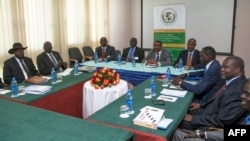South Sudan's warring sides are criticizing Tuesday's U.N. resolution that paves the way for sanctions should the sides fail to reach a comprehensive peace deal by a Thursday deadline. The last-ditch talks in Addis Ababa aimed at ending 15 months of violence in the world’s youngest country.
After months of frustration with South Sudan’s government and rebels, the U.N. Security Council moved Tuesday to make good on threats of sanctions unless the sides reach a detailed power-sharing agreement by the March 5 deadline.
The U.N. resolution came as South Sudanese President Salva Kiir and rebel leader Riek Machar continued to meet behind closed doors here in Addis Ababa.
South Sudan opposition delegation member Goi Jooyul said the United Nations acted prematurely.
“As much as the resolution is disturbing at this point because we are still negotiating, and we have not reached a conclusion to the peace process. But we also welcome the resolution to those people who are obstructing peace,” said Jooyul.
If imposed, the sanctions would freeze assets and travel for anyone seen as obstructing the peace process or committing human rights abuses. An arms embargo may follow if the two sides do not abide by the peace deal.
The 15-month conflict - caused by a political split between Kiir and his former deputy Machar - has killed more than 10,000 people and displaced 1.5 million.
More than a year of talks has failed to produce a concrete peace deal and all ceasefires have been quickly broken.
There is no public indication of progress in this round of negotiations. Kiir and Machar spoke to each other for about five hours on Tuesday and they continued Wednesday morning.
Jooyul said the two parties were still far apart on the issue of security.
“We believe that issues of security needs a lot of trust building and therefore we are requesting for more time for the integration of the forces. It should not happen as immediate as the government is demanding,” said Jooyul.
South Sudan’s Minister of Foreign Affairs Barnaba Marial Benjamin also said the threatened sanctions as counterproductive.
“The decision of sanctions actually blocks the peace process. It has also brought into question the agreed partnership between the United Nations and the African Union. They should have waited to see the decision of IGAD, to see the decision of the African Union before they take this decision,” he said.
Benjamin expressed his disappointment in the leading role the United States played in passing the U.N. resolution.
Ethiopian Prime Minister Hailemariam Desalegn told the two sides on Tuesday that “the region and the international community will not stand by and watch a humanitarian and political crisis in South Sudan continue."




